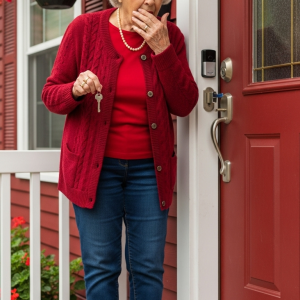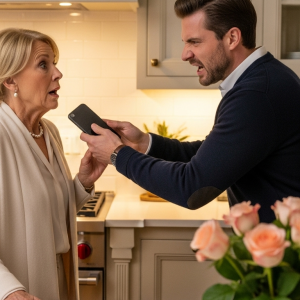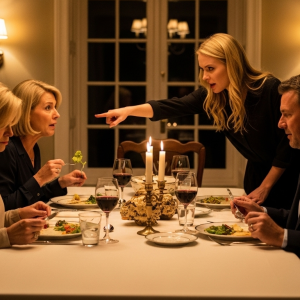The hum of the monitors in Operating Room 3 was a familiar lullaby, a sound that had been the backdrop to my life for nearly a decade. At Stanford Children’s Hospital, I was Dr. Madison Blake, one of the best pediatric neurosurgeons on the West Coast. My gloved hands, steady and sure, held the life of a nine-year-old boy. On the backlit screen, a brain scan showed the stark white bloom of a blood clot, a ticking clock pressed against his motor cortex. One wrong move, one millimeter of error, and the vibrant life of this child could be extinguished.
Behind me, the observation room door hissed open. I didn’t turn. My focus was absolute, a shield I had forged in the fires of a past I refused to let consume me.
Then, a voice cut through the sterile silence, a voice I hadn’t heard in nine years but one that was seared into my memory like a brand.
“Dr. Blake… Madison… Please, you have to save my grandson.”
My breath caught. The scalpel in my hand felt suddenly heavy, cold. That voice. It was a ghost, a specter from a shattered life I had meticulously buried under years of relentless work and sacrifice. I froze, my own world tilting precariously on its axis.
Slowly, I turned. And there she was, standing behind the glass, her face a mask of desperation and fear. Elaine Mitchell. The woman who had once ripped my world to shreds was now here, her fate, and the fate of her grandson, resting in my hands. And as I looked from her to the boy on my table, a chilling realization began to dawn, a question so impossible it threatened to undo me completely
Nine years ago, I was just Madison Blake, an over-worked medical student finishing my residency at Stanford. I came from a modest family, a world away from the tech dynasties and Silicon Valley fortunes that surrounded me. My ambition was my only currency. Then I met Ryan Mitchell.
He was different. He carried the weight of a famous name but wore it like a loose-fitting coat. He wasn’t flashy or arrogant, though his family practically owned half the biomedical innovation sector in the state. He spent his afternoons sitting in on my lectures, fascinated not by profits, but by the potential to reshape children’s healthcare.
“Most people in my world see a problem and write a check,” he told me once, over cheap coffee in the campus quad. “You see a problem and you figure out how to physically fix it with your own two hands. I think that’s incredible.”
His smile disarmed me in ways I couldn’t explain. We fell in love slowly, then all at once. Our nights were filled with drives in his sleek, silent Tesla, exploring the quiet, winding roads of the Palo Alto hills. It became our sanctuary. He spoke of building foundations; I spoke of healing children. It felt like our souls were perfectly aligned.
The night he proposed, the world felt whole. On a hillside overlooking the glittering lights of Los Altos, he dropped to one knee. “Madison Blake,” he said, his voice thick with emotion, “my world was black and white before I met you. You are every color I never knew existed. Will you marry me?”
I said yes without hesitation, tears streaming down my face. For a moment, I truly believed love could conquer anything. I was wrong.
The Mitchells weren’t just wealthy; they were a force of nature. His father was a visionary CEO, but his mother, Elaine, was the true power. A former high-powered attorney, she now ran a multi-million-dollar medical charity with an iron will and a gaze that could dissect a person’s intentions in seconds.
The first time I met her, the air in her pristine mansion felt electric with judgment. She smiled, but it never reached her eyes. “So, Madison,” she began, her tone deceptively light, “Ryan tells me you’re quite… ambitious. Where did you say you were from again?”
Every question was a carefully aimed dart, designed to remind me of the chasm between our worlds. I parried as best I could, clinging to the hope that Ryan’s love was enough.
It wasn’t. Elaine hired private investigators. A week later, Ryan showed up at my small apartment, his face pale, a manila envelope in his hand. He didn’t have to say a word. I saw the photos—college parties, a dinner date with a classmate from a wealthy family—innocuous moments twisted into a narrative of a gold-digger.
“Madison, I just have to ask,” his voice was strained, “is this real? What we have? Or were you just looking for a way out?”
His words were a physical blow. After everything we had shared, after every dream we’d mapped out under the stars, he could still ask me that. The fight was bitter and heartbreaking.
“If you can’t trust me, Ryan,” I finally said, my voice cracking as I pulled the elegant ring from my finger and pressed it into his palm, “then what is left?”
I walked out of the room, my heart a shattered wreck. I never imagined it would be the last time I’d see him alive.
The call came at 2:13 a.m. a disembodied voice informing me of an accident on a slick, winding road. “He didn’t survive the crash,” the voice said, clinically. My knees gave out, and the world went dark.
The next day, I walked the sterile halls of the hospital in a daze, my body a vessel carrying a universe of pain. I found Elaine outside the morgue. Her perfect composure had finally cracked, but when she saw me, her grief morphed into pure, unadulterated rage.
“What are you doing here?” she hissed, her voice low and venomous. “You have no right.”
“They called me,” I whispered, numb. “I was his emergency contact.”
“That’s all you ever were—an emergency. A detour,” she spat, stepping closer. “He was distracted, heartbroken because of you. This is your fault. You are the reason my son is gone.”
The accusation, so cruel and unjust, left me speechless. I turned and walked away, her words chasing me down the corridor. I retreated into a shell of grief, the world outside fading to a dull, gray blur.
Weeks later, a different kind of shock jolted me back to life. A missed cycle, a frantic trip to the pharmacy, and two faint pink lines on a plastic stick. I was pregnant. Ryan’s child was growing inside me.
That tiny, flickering heartbeat on the ultrasound screen became my anchor in a sea of despair. It was the one piece of Ryan I had left, the one reason to pull myself out of bed each morning.
The pregnancy was a lonely marathon. Elaine made it clear at the funeral—her cold glare across the casket was a clear sign I was not welcome in her world of grief. So I focused on surviving. I worked, I studied, I whispered promises to the little life inside me. “We’re going to be okay, little one. I promise.”
When the first kick came, I cried for the first time in months—not tears of grief, but of a fragile, burgeoning hope.
The delivery came early on a rainy spring morning. The pain was blinding, but through it all, I clung to one thought: I’ll finally hold him. I’ll see Ryan’s eyes again.
After a final, agonizing push, the room filled with the sound of a baby’s cry. But the sound stopped too soon. A sudden, terrifying silence descended.
“What’s wrong?” I panted, panic clawing at my throat. “Why isn’t he crying?”
A nurse’s face tightened. A doctor appeared, his voice calm but tense. “There’s a breathing issue. We need to move quickly.” I watched in a haze of shock and exhaustion as my baby was whisked across the room to an incubator. The world began to spin, and just before I blacked out from a wave of administered sedation, I heard Elaine’s voice from the hallway, sharp and commanding. Then, nothing.
When I woke hours later, a nurse stood beside me, her expression grim. “Madison, I’m so sorry. There were complications with the umbilical cord. We did everything we could.”
They placed a silent, swaddled bundle in my arms. I looked at the pale, still face and screamed, a raw, primal sound of a world ending for the second time. But even through the fog of my grief, a tiny, insistent voice in my head whispered, This isn’t him. This isn’t my baby.
In the nine years that followed, I rebuilt myself from the ashes. I didn’t move on; I moved forward, constructing a fortress around my heart with the bricks of discipline and dedication. I poured every ounce of my being into becoming the best. My colleagues called my hands “glass and steel”—glass for their delicate precision, steel for their unshakable resolve in impossible cases.
I never dated. I never allowed myself to get close to anyone. Love was a liability, an open wound I couldn’t risk exposing again. My life became a cycle of long hours, complex surgeries, and the quiet, sterile emptiness of my apartment. I was respected, admired, but utterly alone. It was the only way I knew how to survive.
And now, the architect of my ruin was standing before me, begging me to save the one thing she had left. As I stared at the boy on the operating table—Noah Mitchell—the name felt like a punch to the gut. The impossible question that had formed earlier now screamed in my mind.
The surgery was the most difficult of my career. Every precise cut, every delicate suture was performed while a war raged within me. I was operating on the grandson of the woman who blamed me for her son’s death. The irony was a bitter pill. But as I worked, all that mattered was the child.
Hours later, with Noah stable in recovery, I found Elaine in the waiting room. She looked older, the years having etched lines of sorrow into her face that no fortune could erase.
“Thank you,” she whispered, her voice hoarse.
I didn’t respond. My eyes were fixed on the boy through the glass. And then I saw it. A small, faded, handmade bracelet on his wrist. It was made of blue cord with a single silver bead. A bead I had etched with a tiny, imperfect ‘N’.
My blood ran cold. I had made that bracelet nine years ago in a prenatal crafting class. It was meant for my Noah.
I turned to Elaine, my voice dangerously quiet. “Where did he get that bracelet?”
Her face went ashen. For the first time, I saw the formidable Elaine Mitchell look terrified. Her gaze darted away for a fraction of a second, but it was enough. In that flicker of guilt, I saw the truth.
“You were there that night, weren’t you?” I pressed, stepping closer. “At the hospital. I heard your voice before I passed out. My son didn’t die, did he, Elaine? You took him.”
Elaine crumbled. The matriarch, the titan of industry, sank into a chair, her composure shattering like glass.
“Ryan was gone,” she sobbed, her words broken. “I couldn’t lose his child, too. Not to… not to you. I thought I was protecting him. I told myself you weren’t stable, that he deserved the life I could give him.”
She explained it all in a torrent of guilt and justification. The doctor she had funded for years, the quiet transfer, the falsified records. She had used her power to orchestrate the ultimate deception, leaving me to grieve a child who was alive and well, living just miles away.
“And now?” I asked, my voice hollow. “Why tell me now?”
She looked up, and the tears in her eyes were real. “I have terminal brain cancer, Madison. I have months, maybe less. I couldn’t… I can’t let him be alone. He needs to know his mother. He needs you.”
The revelation was a gut punch. Forgiveness felt impossible, a distant star in a blacked-out sky. But looking at Noah, sleeping peacefully, I knew my anger couldn’t be the focus. He was the only thing that mattered.
“You will tell him,” I said, my voice hardening with resolve. “You will tell him everything. You owe him that truth.”
The days that followed were a surreal blend of pain and wonder. Elaine, true to her word, told Noah everything. I watched as my son, a boy I had only just met, processed a truth that would reshape his entire world.
There were tears. There were questions. There were hesitant moments when he would look at me, a stranger who was suddenly his mother. But there were also small miracles. The first time he called me “Mom,” my heart ached with a joy I thought I’d never feel again. We discovered shared quirks—a love for the same obscure flavor of ice cream, a habit of humming when we concentrated.
Elaine passed away peacefully a few weeks later. In her final moments, she asked for my forgiveness. I couldn’t give her the absolution she wanted, but I offered her something else: a promise. “I will love him enough for the both of us,” I whispered.
A month later, Noah and I stood on the shore of Half Moon Bay, the place Ryan had always said was his favorite. The setting sun painted the sky in hues of orange and pink.
“Do you think Dad can see us?” Noah asked, his small hand tucked firmly in mine.
“I think,” I said, squeezing his hand, “that he’s been watching over you this whole time.”
We stood there, mother and son, watching the waves wash away our footprints in the sand, leaving a clean, unmarked shore ahead of us. The past was a part of our story, a landscape of scars and shadows, but it was no longer our destination. For the first time in nine years, my life wasn’t about what I had lost. It was about what I had finally, miraculously, found.




